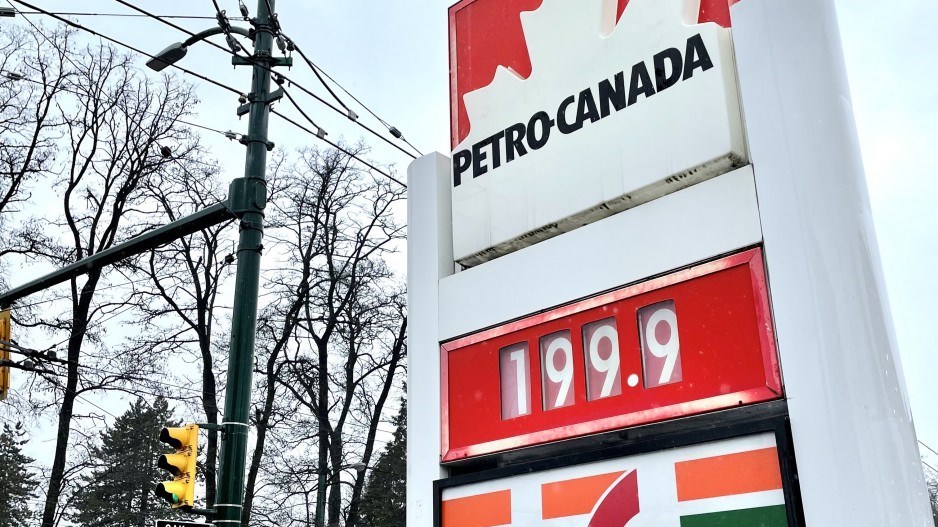B.C., federal carbon taxes are the same, so why do British Columbians still pay more?
Carbon taxes go up April 1 across Canada, from $65 per tonne of CO2 to $80 per tonne, except in Quebec, but British Columbians will still generally pay more, due to the fact less carbon tax revenue gets kicked back to consumers in the form of rebates than elsewhere in Canada.
B.C.’s carbon tax goes up April 1 to $80 per tonne of CO2, as does the federal carbon tax, which applies in those provinces that didn’t already have a provincial carbon pricing scheme in place. But Canadians in other provinces get more back in rebates than British Columbians do, said Carson Binda, B.C. director for the Canadian Taxpayers Federation.
“British Columbians are absolutely getting the short end of the stick here,” he said.
B.C. was the first province in Canada to introduce an economy-wide carbon tax in 2008. Quebec had introduced carbon pricing in the form of cap and trade in 2007. Quebec’s carbon pricing is lower than what other Canadians now pay. Quebec’s carbon pricing adds about 10 cents to a litre of gasoline, compared to 14 cents per litre everywhere else in Canada.
In 2019, the federal government’s carbon pricing backstop went into effect, meaning people in provinces like Saskatchewan, Ontario and Alberta that had not been paying a consumer carbon tax on heating and transportation fuels had to start paying federal tax.
The federal tax was originally lower than B.C.’s carbon tax, but has since caught up, and the prices are now harmonized at the same rates -- $65 per tonne in 2023, rising to $80 per tonne April 1.
As of April 1, the carbon tax on gasoline will rise from $0.14 per litre to $0.17 per litre. Diesel and heating oil will go up by about four cents, from $0.17 to $0.21 per litre. Natural gas for home heating will go up by three cents, from $0.12 per cubic metre to $0.15.
Although B.C.’s carbon tax was originally revenue neutral when it was first adopted in 2008, at $10 per tonne, it no longer is. The government takes in much more in carbon taxes than it gives back in rebates.
Binda notes that, for the 2024-25 fiscal year, the B.C. budget expects to raise $2.56 billion in carbon tax revenue, and projects to spend $1 billion on rebates.
In B.C., only those who earn $39,115 a year or less will get a full rebate of $447 for the year. The rebate declines to zero once income hits $61,465 a year.
Rebates in other provinces that now pay the federal carbon tax are not income-tested. Everyone who fills out an income tax return gets a rebate. For example, in Alberta, a single person will get four instalments of $225 for 2024-25 – a total of $900. In Ontario, it’s $560 for the year.
“The federal government’s carbon tax rebates aren’t income tested – in B.C. they are,” Binda said. “And that’s a big issue with how it’s administered here in B.C. because of how low the income thresholds are.
“Normal, middle-class British Columbians are getting raked over the coals with what has historically been the highest carbon tax in Canada, and most people aren’t seeing a penny back from the province.”
Seven premiers in Canada have called on the Trudeau government to halt the April 1 carbon tax increase. B.C.’s Premier David Eby is not among them.
But he should be, according to a Leger poll commissioned by the CTF. The poll found 73 per cent of British Columbians want Eby to join the seven other premier in calling for a halt to the April 1 carbon tax hike.
Carbon taxes were proposed as a way of discouraging the use of fossil fuels by making them increasingly unaffordable. This would result in reduced use of fossil fuels, switching to cleaner energy sources, and reduced greenhouse gas emissions.
“The carbon tax isn’t working in B.C. for its stated goal of reducing emissions,” Binda said.
He noted that, over a 10-year period, GHG emissions actually rose in B.C., from 60.3 metric tonnes (MT) of CO2e in 2011 to 62 MT CO2 in 2021.
It should be noted that B.C.’s population grew during that 10-year period, from 4.4 million to 5 million, and its economy grew as well, with GDP growing from $219 billion to $288 billion.
Canada-wide, emissions have fallen nearly eight per cent since the federal carbon tax went into effect, according to a letter signed by more than 100 Canadian economists – most of them academics – who support carbon taxes.
“A new report from the Canadian Climate Institute shows that federal and provincial carbon pricing, for industries and consumers, is expected to account for almost half of Canada’s emissions reductions by 2030,” states the letter, which was written in response to increased calls from premiers and the federal Conservatives to scrap the federal carbon tax.
It notes that carbon pricing is not the only method for reducing GHGs, but says it’s the most cost-effective.
“Carbon pricing is the lowest cost approach because it gives each person and business the flexibility to choose the best way to reduce their carbon footprint. Other methods, such as direct regulations, tend to be more intrusive and inflexible, and cost more.”





